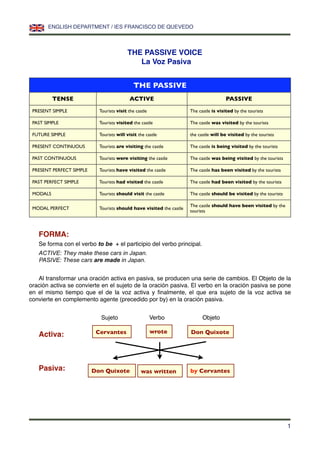
Passive voice
- 1. THE PASSIVE VOICE La Voz Pasiva THE PASSIVE TENSE ACTIVE PASSIVE PRESENT SIMPLE Tourists visit the castle The castle is visited by the tourists PAST SIMPLE Tourists visited the castle The castle was visited by the tourists FUTURE SIMPLE Tourists will visit the castle the castle will be visited by the tourists PRESENT CONTINUOUS Tourists are visiting the castle The castle is being visited by the tourists PAST CONTINUOUS Tourists were visiting the castle The castle was being visited by the tourists PRESENT PERFECT SIMPLE Tourists have visited the castle The castle has been visited by the tourists PAST PERFECT SIMPLE Tourists had visited the castle The castle had been visited by the tourists MODALS Tourists should visit the castle The castle should be visited by the tourists MODAL PERFECT Tourists should have visited the castle The castle should have been visited by the tourists FORMA: Se forma con el verbo to be + el participio del verbo principal. ACTIVE: They make these cars in Japan. PASIVE: These cars are made in Japan. Al transformar una oración activa en pasiva, se producen una serie de cambios. El Objeto de la oración activa se convierte en el sujeto de la oración pasiva. El verbo en la oración pasiva se pone en el mismo tiempo que el de la voz activa y finalmente, el que era sujeto de la voz activa se convierte en complemento agente (precedido por by) en la oración pasiva. Sujeto Verbo Objeto Activa: Pasiva: ENGLISH DEPARTMENT / IES FRANCISCO DE QUEVEDO 1 Cervantes Don Quixotewrote by Cervanteswas writtenDon Quixote
- 2. Los verbos modales (can, must, have to, should, etc) y la forma going to no pueden ponerse en pasiva ya que no tienen participio.En estos casos, es el infinitivo que va detrás el que se pone en pasiva: He had to abandon the house > The house had to be abandoned. The family is going to sell their house > Their house is going to be sold. You can do it easily > It can be done easily. El uso de la voz pasiva es muy frecuente e inglés. Se utiliza sobre todo cuando nos interesa más la acción realizada que el sujeto que la realiza, bien porque éste es desconocido, es poco importante o no se quiere nombrar. También se suele usar la pasiva cuando el sujeto de la oración activa es un pronombre persona (we, they, etc), nobody, somebody, etc. They discovered the truth > The truth was discovered. (Lo importante es la acción, no quién la hizo) Someone broke the glass > The glass was broken. (No se sabe quién lo ha roto) Cuando se quiere nombrar al sujeto de la oración activa, este se utiliza como complemento agente en la oración pasiva precedido de la preposición by. Shakespeare wrote hamlet > Hamlet was written by Shakespeare. Picasso painted that picture > That picture was painted by Picasso. Si el sujeto de la oración activa es un pronombre personal (I, you, he, she, it, we, you, they), al pasarla a pasiva debes cambiarlo por su correspondiente pronombre objeto (me, you, him, her, it, us, you, them) ya que va detrás de la preposición by. No obstante, cuando el sujeto de la activa es un pronombre personal no se suele poner como complemento agente en la pasiva. He will inform everybody > Everybody will be informed (by him) ACTIVA CON 2 OBJETOS. Si la oración activa tiene dos objetos (objeto directo y objeto indirecto) pueden hacerse dos pasivas; una con el objeto directo como sujeto de la oración pasiva y otra con el objeto indirecto como sujeto de la oración pasiva. La más común de las dos es que que toma como sujeto pasivo el objeto indirecto de la oración activa. ACTIVA: They offered Harry a good job PASIVA 1: Harry was offered a good job. PASIVA 2: A good job was offered to Harry. ENGLISH DEPARTMENT / IES FRANCISCO DE QUEVEDO 2
- 3. Como hemos mencionado anteriormente, la primera es la más común. Fijaté, además, como cuando se utiliza como sujeto de la pasiva el objeto directo, al poner el objeto indirecto, éste irá precedido de “to”. Entre los verbos que admiten esta estructura cabe destacar: give, send, show, lend, ask, tell, order y pay. They didn´t lend us any money > We weren´t lent any money. No nos prestaron dinero They have paid me a lot of money this time > I have been paid a lot of money this time. Me han pagado mucho dinero esta vez OTROS USOS DE LA PASIVA. La pasiva puede emplearse también, con verbos como say, think, report, know, believe, etc. En estos casos, y en estructuras como las que veremos a continuación, podemos formar dos tipos diferentes de pasiva. ACTIVA: Experts say that this house dates back to the 12th century. PASIVA 1: It is said that this house dates back to the 12th century. PASIVA 2: This house is said to date back to the 12th century. ACTIVA: They believe (that) this sword belonged to King Arthur. PASIVA 1: It is believed that this sword belonged to King Arthur. PASIVA 2: This sword is believed to have belonged to King Arthur. ACTIVA: They thought (that) the flowers had arrived from Holland. PASIVA 1: It was thought that the flowers had arrived from Holland. PASIVA 2: The flowers were thought to have arrived from Holland. ENGLISH DEPARTMENT / IES FRANCISCO DE QUEVEDO 3